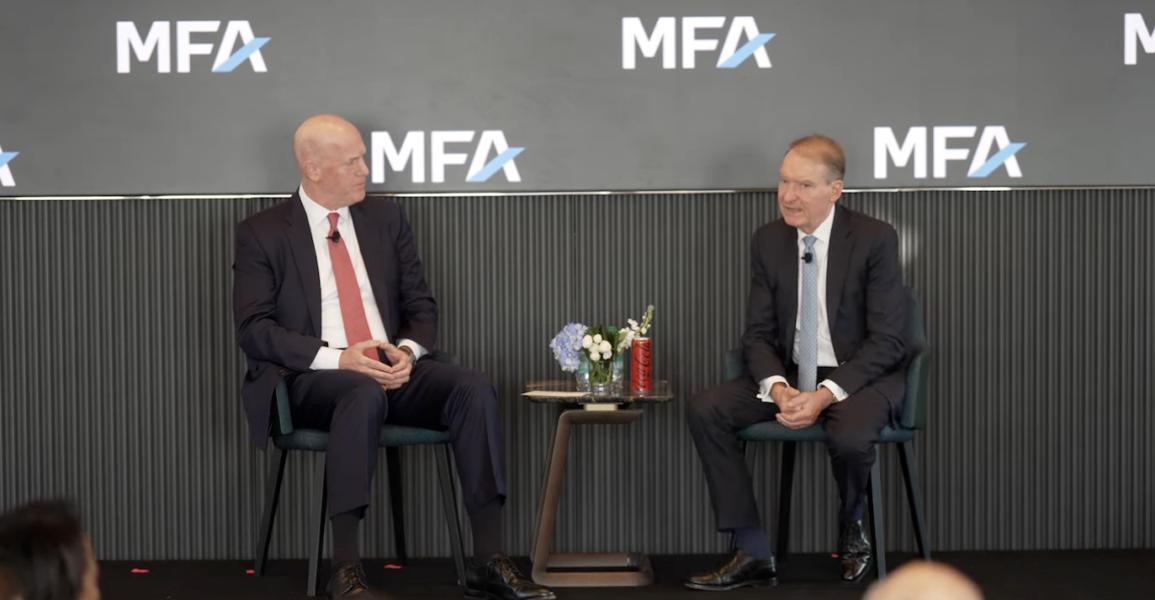Paul Atkins wants to solidify his vision for crypto markets before the political tides change again in Washington. As the new chairman of the U.S. Securities and Exchange Commission, he is quickly moving toward “future-proofing” SEC policies, a move that could define how much freedom the crypto industry enjoys after President Donald Trump leaves office.
At a conference hosted by the Managed Funds Association in New York on Tuesday, Atkins said the SEC would work quickly to adopt rules that could “future-proof” its program. He specifically discussed the removal or weakening of regulations on public and private markets, both of which could impact the cryptocurrency industry after Trump or Atkins leave office.
“We have, I think, a tremendous opportunity to come together and, in a positive spirit, kind of create something that’s sustainable,” Atkins said of the U.S. regulators’ collaboration. “My main concern is to ensure that this situation is sustainable in the face of potential future changes. What we need to do is implement things, get them agreed, and then let the market work (…)”
Regarding collaboration with the Commodity Futures Trading Commission (CFTC), the SEC Chairman said:
“As we move forward, especially with digital assets, the one thing I try to caution people about is that we can’t have two fortresses on either side of a no-occupancy zone, because that no-occupancy zone is currently littered with the bodies of potential products that have been killed in the crossfire of the two agencies over the years.”

Even before the U.S. Senate confirmed Atkins as SEC chair in April, then-Acting Chairman Mark Uyeda had significantly changed the agency’s approach to digital assets by closing several investigations and cases against crypto companies and creating a crypto task force under Commissioner Hester Peirce.
Under Atkins, the commission changed listing standards for crypto exchange-traded funds (ETFs), reportedly considered allowing stocks to be traded on the blockchain, considered dropping the agency’s quarterly reporting requirements, and held a roundtable with the CFTC to “harmonize” regulations.
“(T)he dynamic behind digital assets is difficult to reverse,” said Andrew Forson, president of Canada-based DeFi Technologies, in response to an email from Cointelegraph. “US policy, even amid differing leadership philosophies, has increasingly aligned traditional capital markets with decentralized finance. »
Could a future US president dismantle all of the SEC’s work with the stroke of a pen?
Although Atkins has broad authority to propose and support rules and policies favoring the crypto industry, he has been closely aligned with the current administration, based on public statements. As SEC chairman, he can direct the agency to pursue enforcement actions and adopt policies.
Shortly after former SEC Chairman Gary Gensler resigned in January, the agency softened its approach to cryptocurrency enforcement, dropping years-long investigations and cases. Some might wonder whether a future U.S. president who might be more anti-crypto or neutral on technology would be able to quickly overturn Atkins’ agenda, as the SEC is doing for many of Gensler’s positions.
“It would be difficult for a new SEC chairman to completely reverse the policies proposed by Chairman Atkins,” Forson told Cointelegraph. “However, a future administration could impose additional reporting requirements and compliance burdens, which would effectively slow progress and innovation. This would echo the early days of ICOs, when excessive regulation stifled legitimate token offerings.”
Forson added:
“If a less crypto-friendly administration takes over, existing instruments would likely be grandfathered in, but new entrants would face significant headwinds. Regulatory changes might temper innovation, but they cannot dismantle the already solidly established ecosystem.”
David B. Hoppe, a technology and media attorney and founder of Gamma Law, offered a slightly different view, saying future SEC chairs could not unilaterally roll back the agency’s rules and regulations. However, they could change the SEC’s “internal priorities” established by Atkins and redirect resources toward pursuing prosecutions and investigations against crypto companies.
“With a vote by the SEC commissioners, the incoming chairman could also rescind official SEC policies announced under Mr. Atkins,” Hoppe told Cointelegraph. “This could mean a return to the SEC’s previous position that crypto projects presumptively implicate the securities laws. Although non-binding, SEC policy statements communicate SEC rule interpretations and enforcement priorities and may significantly affect market participants.”
What about SEC regulations changed by Congress?
A market structure bill currently working its way through the U.S. Senate could also significantly change SEC regulations and, if passed and signed into law, would require another act of Congress to amend or overturn it. However, according to Hoppe, some of the market structure law’s changes would likely face fewer challenges.
“(A)ny regulations adopted by the SEC and CFTC to implement the Market Structure Act would be much easier to modify or withdraw, because they would only have to go through the standard notice and comment process (or other applicable procedure),” Hoppe told Cointelegraph. “The SEC or CFTC may, in the future, decide to reinterpret the provisions of the Market Structure Act and modify or withdraw the regulations accordingly.”
Cointelegraph reached out to Atkins for comment but did not receive a response at the time of publication.
On Thursday, the US government entered its ninth day of paralysis caused by lawmakers’ inability to reach agreement on a funding bill. The SEC continues to operate with reduced staff and operations, but Atkins said Tuesday the agency is “not slowing down” amid the shutdown.




